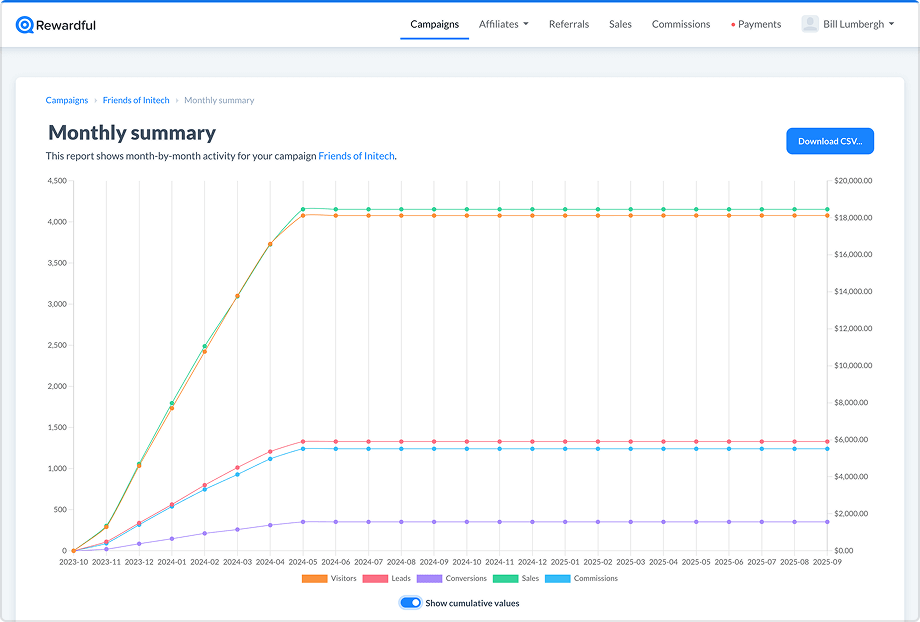Are you looking to boost your digital marketing efforts and increase your customer base? There are countless roads that lead to Rome, and in this article, we'll compare two of them: affiliate marketing vs referral marketing.
Understanding referral marketing vs affiliate marketing is crucial for businesses looking to expand their reach through word-of-mouth strategies.
While they may seem similar on the surface, there are key differences between the two.
In this article, we'll delve into the distinctions and provide insights on when to use each type of partnership.
What is the Difference Between Referral and Affiliate Marketing?
Affiliate marketing and referral marketing are terms that are often used interchangeably. However, there are many differences, both from the perspective of the referring customers and affiliates and the businesses using these strategies.
In a nutshell: affiliate marketing focuses on partnerships with external affiliates to drive sales and revenue, while referral marketing, on the other hand, centers around leveraging the recommendations of satisfied customers to expand existing customer base.
That’s the short explanation.
In reality, there are many more nuances, which you can explore in the table below.

To make it more clear which is which, let’s dive into each individual strategy.
What is Affiliate Marketing?
Affiliate marketing is a performance-based partnership type where businesses collaborate with individuals or organizations (affiliates) to promote their products or services.
Affiliates earn a commission for each successful sale they generate through their promotional efforts; it's like having an extended sales and marketing team working on your behalf.
How does affiliate marketing work?
Affiliate marketing leverages the power of partnerships to expand your brand's reach. It involves creating an affiliate program and providing affiliates with unique referral links. This information is usually managed in affiliate management software such as Rewardful.
Essentially, affiliates promote your products or services through various channels such as websites, blogs, social media, or email marketing. When a customer clicks on their referral link and completes a purchase, the affiliate receives a commission for their advertising efforts.
When to use affiliate marketing:
- If you want to reach a broader audience: partner with affiliates who have a strong online presence. Tap into their established audience and reach new potential customers.
- If you want to drive sales and revenue without investing in expensive campaigns: with affiliates actively promoting your offerings, you can increase sales and generate revenue without significant upfront costs.
- If you want to scale your marketing efforts without growing your marketing team: affiliate marketing allows you to scale your promotional activities rapidly by leveraging the influence and reach of your affiliates.
What is Referral Marketing?
Referral marketing relies on satisfied customers to spread the word about your brand. It capitalizes on the natural tendency of people to trust recommendations from friends, family, and colleagues. By incentivizing and empowering your existing customers to refer others and using the best referral software, you can unlock the power of word-of-mouth marketing.
How does referral marketing work?
Referral marketing involves encouraging your customers to refer your products or services to their network in exchange for rewards. It's all about turning your loyal customers into brand advocates. By providing incentives such as discounts and exclusive perks, you motivate your customers to recommend your business to others.
When to use referral marketing:
- If you want to foster customer loyalty: referral marketing nurtures the bond with your existing customers by rewarding their loyalty and engagement. Referral programs are great for community building.
- If you want to leverage trust and credibility: recommendations from friends and family carry significant weight, building trust and credibility for your brand. The best marketers are happy customers.
- If you want to harness organic growth: referral marketing taps into the power of word-of-mouth, allowing your customer base to become active promoters and attract new customers organically.
The Difference Between Referral vs Affiliate Marketing from the Customer Perspective
Let's compare referral marketing vs affliate marketing and see how these two approaches vary for the individuals involved.
What do Affiliate Marketers do?
In affiliate marketing, the affiliate is an external partner who collaborates with a business to promote its products or services. The affiliate's primary goal is to drive sales and earn a commission for each successful sale they generate. An affiliate can also be a customer, but it's not a prerequisite to enrol into an affiliate program.
Affiliates typically have their own platforms, such as websites, blogs, or social media channels, where they promote the products or services using unique referral links or promo codes. They focus on attracting potential customers and convincing them to make a purchase.
The affiliate's success lies in their ability to drive sales and earn commissions, which directly correlates with their promotional efforts. Affiliate marketing could even be their main source of income, making them much more dedicated and active than referring customers who get rewards.
What do Referring Customers do?
Referral partners rely on their existing knowledge of a brand's products or services. The referring customer acts as a brand advocate and influences others to try out a certain product or service they use.
Referral marketing recognizes the power of word-of-mouth recommendations and leverages the trust and credibility that customers have with their friends, family, or colleagues. The referring customer is motivated by incentives or rewards offered by the brand for each successful referral they make, but it's by no means their way of generating an income.
There can be a referral program or scheme in place, but generally speaking, these customers or users recommending the product won't deploy as many ‘marketing’ tactics as affiliates do. Referral marketing in that sense can also simply be recommending products to friends and then receiving a discount on your next order. Referral marketing normally doesn't involve monetary compensation, like affiliate marketing, but this difference is getting more blurred out lately.
Affiliate and Referral Marketing Difference From a Business Perspective
Referral marketing taps into the power of recommendations. It harnesses the natural inclination of people to trust the opinions of their friends, family, and colleagues.
In a way, affiliate marketing also uses recommendations. But that is not the core focus; it is more the power of influencers, marketing strategies, being an authority in a specific field, and more. Referral management would require you to set up the program, answer questions about it, promote the program and make sure everyone gets what they’re owed.
Affiliate marketing would require more management, and generally takes more effort to set up, because payments are involved. You want to keep an eye on what affiliates are doing, and want to provide them with materials that could support their (in reality - your) marketing efforts. Affiliate marketing will ‘’cost’’ more in commissions than referral marketing would ‘’cost’’ in discounts given – but these costs only occur when extra sales are being made, so as a business, you’ll win either way.
Referral Program vs Affiliate Program: What is Better?
There’s no one true answer. It depends on your business.
Both partnership types have their unique strengths and can be used together or independently, depending on your business goals and target audience. It's all about finding the right balance and implementing the approach that suits your brand's needs and objectives.
Getting Started with Affiliate or Referral Marketing
The success of both lies in a solid foundation on which your program is built. Make sure you and your users, customers and affiliates are benefiting as much as possible from your program, by using Rewardful , which allows you to create your own affiliate or customer referral program within minutes. That is, if you are already using Stripe or Paddle.

FAQs about Affiliate and Referral Marketing
Q: Can I use both affiliate and referral marketing simultaneously?
A: Absolutely! In fact, many businesses combine both strategies to maximize their marketing efforts and tap into different target audiences. Just make sure you communicate clearly about the differences in rewards and responsibilities to your promoters.
Q: Are there specific industries that benefit more from affiliate or referral marketing?
A: Both strategies can be effective across various industries. Affiliate marketing often works well with SaaS or subscription-based products, while referral marketing can benefit industries with a strong emphasis on customer relationships, such as service providers.
Q: What are some creative ideas for referral programs?
A: You can explore various referral program ideas, such as offering exclusive discounts, freebies, store credit, or even organizing referral contests with exciting prizes. Make it part of your online community and make sure to clearly communicate that your referral program is easy to use.
Q: Is referral marketing more cost-effective than affiliate marketing?
A: Generally, referral marketing requires a lower upfront investment since it leverages existing customers. However, the overall cost-effectiveness of each strategy depends on your specific business goals and the implementation of your marketing campaigns.













